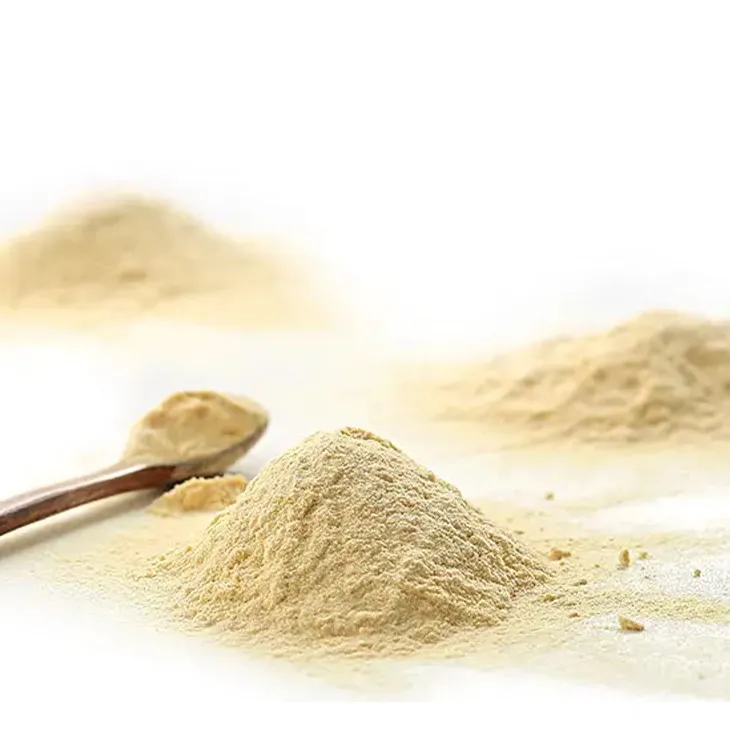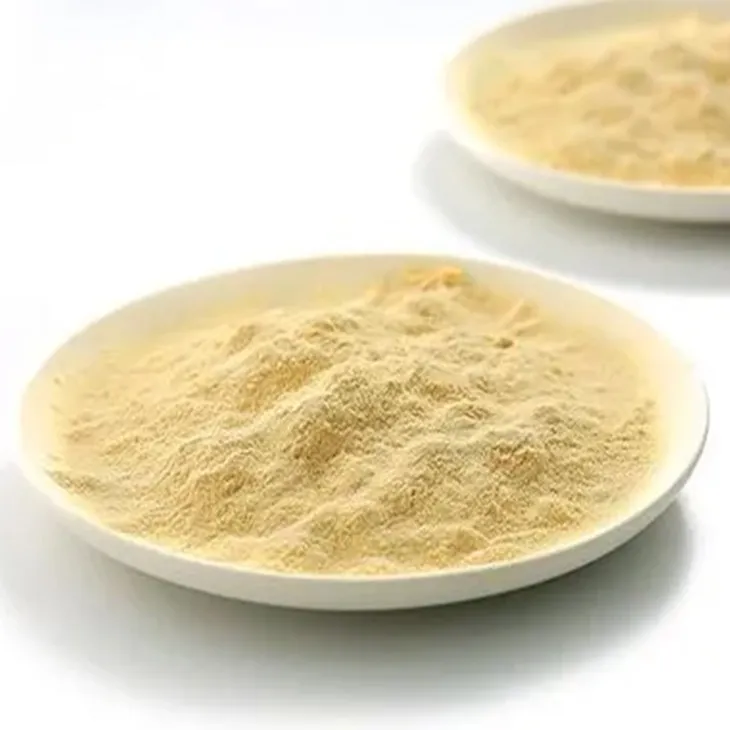- 0086-571-85302990
- sales@greenskybio.com
Standard - process selenium yeast.
2024-11-28

1. Introduction
Standard - process Selenium yeast is a remarkable product that has garnered significant attention in various fields. It is a product that combines the beneficial properties of yeast and selenium, resulting in a multi - functional substance with far - reaching implications for human and animal health, as well as for the quality enhancement of food and feed products.

2. Production Process of Standard - process Selenium yeast
2.1 Selection of High - quality Yeast Strains
The production of standard - process Selenium yeast begins with the careful selection of yeast strains. High - quality yeast strains are crucial as they serve as the foundation for the entire production process. These strains should possess certain desirable characteristics such as good growth rate, high adaptability to different environmental conditions, and strong metabolic capabilities. Different yeast strains may have different responses to selenium incorporation, and thus, choosing the right strain is essential for ensuring the final product's quality and functionality.
2.2 Selection of Selenium Sources
Another critical aspect is the selection of selenium sources. Selenium can be obtained from various sources, but not all are suitable for use in selenium yeast production. Inorganic selenium sources such as sodium selenite and sodium selenate are commonly considered due to their availability and cost - effectiveness. However, recent trends also show an increasing interest in using organic selenium sources as they may offer better bioavailability and less potential toxicity. The choice of selenium source needs to be balanced in terms of cost, availability, and the desired properties of the final product.
2.3 Fermentation Conditions
- Temperature: Maintaining the appropriate temperature during fermentation is vital. Different yeast strains have their optimal growth temperatures, and deviations from this range can affect the yeast's growth rate and its ability to incorporate selenium. For most yeast strains used in selenium yeast production, a temperature range of around 25 - 30°C is often considered suitable. At lower temperatures, the yeast's metabolic activity may slow down, leading to a longer fermentation time and potentially incomplete selenium incorporation. On the other hand, higher temperatures can cause stress to the yeast cells, affecting their viability and the quality of the final product.
- pH: The pH of the fermentation medium also plays a significant role. Yeast typically thrives in a slightly acidic environment. A pH range of around 4 - 6 is often preferred for selenium yeast production. If the pH is too high or too low, it can disrupt the yeast's enzymatic activities, which are involved in various metabolic processes including selenium uptake and assimilation. Adjusting and maintaining the proper pH throughout the fermentation process requires careful monitoring and the use of appropriate buffering agents.
- Oxygen Supply: Adequate oxygen supply is necessary for yeast growth, especially during the initial stages of fermentation. Yeast is a facultative anaerobe, meaning it can grow in both aerobic and anaerobic conditions. However, during the selenium yeast production process, a certain level of aerobic conditions is beneficial for promoting yeast growth and selenium uptake. Insufficient oxygen can lead to a decrease in yeast biomass production and inefficient selenium incorporation, while excessive oxygen may cause oxidative stress to the yeast cells.

3. Health Benefits of Standard - process Selenium Yeast
3.1 Role in Antioxidant Defense
Standard - process selenium yeast is beneficial for human health in numerous ways. One of its key functions is enhancing the antioxidant capacity. Selenium is an essential component of glutathione peroxidase, an important antioxidant enzyme in the body. Glutathione peroxidase helps to protect cells from oxidative damage by reducing hydrogen peroxide and lipid peroxides. When selenium is incorporated into yeast in the form of standard - process selenium yeast, it can be effectively utilized by the body to support the production and activity of glutathione peroxidase. This, in turn, helps to maintain the balance between oxidants and antioxidants in the body, reducing the risk of various diseases associated with oxidative stress such as cardiovascular diseases, certain cancers, and neurodegenerative disorders.
3.2 Regulation of the Immune System
Another important aspect of standard - process selenium yeast's health benefits is its role in regulating the immune system. Selenium has been shown to influence the function of immune cells such as lymphocytes, macrophages, and neutrophils. It can enhance the immune response by promoting the production of cytokines, which are small proteins involved in cell - to - cell communication in the immune system. Additionally, selenium helps to maintain the integrity of the immune cells' membranes, protecting them from damage and ensuring their proper functioning. By incorporating standard - process selenium yeast into the diet, individuals can potentially boost their immune system, making them more resistant to infections and diseases.
3.3 Maintenance of Thyroid Function
The thyroid gland is a vital endocrine organ that plays a crucial role in regulating metabolism, growth, and development. Selenium is necessary for the proper functioning of the thyroid gland. It is involved in the synthesis and activation of thyroid hormones. In the thyroid gland, selenium - containing enzymes are responsible for converting the inactive form of thyroid hormone (T4) to the active form (T3). Standard - process selenium yeast can provide a reliable source of selenium to support thyroid function. Deficiency in selenium can lead to thyroid disorders such as hypothyroidism, which can cause symptoms like fatigue, weight gain, and cold intolerance. By ensuring an adequate intake of standard - process selenium yeast, individuals can help maintain normal thyroid function.
4. Applications in the Food and Feed Sectors
4.1 Enrichment of Food Products with Selenium
- In the food industry, standard - process selenium yeast is used to enrich various food products with selenium. Selenium - enriched foods are becoming increasingly popular as consumers are more aware of the importance of selenium in their diet. Common food products that can be enriched with selenium yeast include bread, cereals, and dairy products. For example, in bread - making, selenium yeast can be added during the dough - making process. This not only increases the selenium content of the bread but also does not significantly affect the taste and texture of the final product. Similarly, in cereals, selenium yeast can be incorporated during the manufacturing process, providing a convenient way for consumers to obtain selenium through their regular diet.
- Enriching food products with selenium yeast also offers a more natural and bioavailable form of selenium compared to inorganic selenium supplements. The yeast - bound selenium is more easily absorbed by the body, which means that consumers can obtain the benefits of selenium more effectively. This is particularly important for individuals who may have difficulty absorbing inorganic selenium or for those who are looking for a more natural source of this essential nutrient.
4.2 Improvement of Animal Product Quality in the Feed Sector
- In the feed sector, standard - process selenium yeast has significant applications. It is used to improve the quality of animal products such as meat, eggs, and milk. When animals are fed with feed containing selenium yeast, the selenium is incorporated into their tissues. In poultry, for example, selenium yeast supplementation can result in eggs with higher selenium content. These selenium - enriched eggs are considered more nutritious and may have a longer shelf - life. In livestock such as cattle and pigs, the use of selenium yeast in feed can improve the quality of meat, making it more tender and with better color. Additionally, selenium in the animal's diet can also enhance their immune system, reducing the incidence of diseases and improving overall animal health.
- The use of standard - process selenium yeast in animal feed also has environmental benefits. Since it is a more bioavailable form of selenium, animals can absorb and utilize it more efficiently. This means that less selenium is excreted in the feces, reducing the potential environmental impact of high selenium levels in manure. This is important for sustainable animal farming practices as it helps to minimize the environmental footprint associated with selenium supplementation in animal feed.
5. Conclusion
Standard - process selenium yeast is a multi - functional product with significant importance in various aspects. Its production process, which involves precise control of yeast strain selection, selenium source choice, and fermentation conditions, is crucial for ensuring the quality and functionality of the final product. The health benefits it offers to humans, including antioxidant enhancement, immune system regulation, and thyroid function maintenance, make it a valuable addition to the diet. In the food and feed sectors, its applications in enriching food products with selenium and improving animal product quality are also of great significance. As research continues to uncover more about the potential of standard - process selenium yeast, its role in promoting health and improving product quality is likely to become even more prominent in the future.
FAQ:
What is standard - process selenium yeast?
Standard - process selenium yeast is a product that is produced through a precise process. It starts from the careful selection of high - quality yeast strains and selenium sources, followed by well - regulated fermentation conditions. It has multiple functions and is important in various fields.
What are the benefits of standard - process selenium yeast for human health?
It has several benefits for human health. For example, it is part of glutathione peroxidase which helps enhance antioxidant capacity. It also plays a role in regulating the immune system and maintaining thyroid function.
How is standard - process selenium yeast used in the food sector?
In the food sector, it is used to enrich products with selenium. This can improve the nutritional value of the food products.
How does standard - process selenium yeast contribute to the quality of animal products in the feed sector?
When used in the feed sector, it enriches the feed with selenium. This selenium is then transferred to the animals, which can improve the quality of animal products such as meat, eggs, and milk.
What are the key factors in the production of standard - process selenium yeast?
The key factors in its production include the selection of high - quality yeast strains and selenium sources, as well as strict control of fermentation conditions.
Related literature
- Selenium Yeast: Production, Properties and Applications"
- "The Role of Selenium Yeast in Health and Nutrition"
- "Standard Processes for Selenium Yeast Production: A Review"
- ▶ Hesperidin
- ▶ citrus bioflavonoids
- ▶ plant extract
- ▶ lycopene
- ▶ Diosmin
- ▶ Grape seed extract
- ▶ Sea buckthorn Juice Powder
- ▶ Beetroot powder
- ▶ Hops Extract
- ▶ Artichoke Extract
- ▶ Reishi mushroom extract
- ▶ Astaxanthin
- ▶ Green Tea Extract
- ▶ Curcumin Extract
- ▶ Horse Chestnut Extract
- ▶ Other Problems
- ▶ Boswellia Serrata Extract
- ▶ Resveratrol Extract
- ▶ Marigold Extract
- ▶ Grape Leaf Extract
- ▶ blog3
- ▶ blog4
-
The best organic white mustard seed extract.
2024-11-28
-
Wholesale Stevia Extract Suppliers.
2024-11-28
-
Nature's best vitamin D3.
2024-11-28
-
The best velvet antlers in 2024.
2024-11-28
-
Okra Extract
2024-11-28
-
Hesperidin
2024-11-28
-
Artichoke Leaf Extract
2024-11-28
-
Phyllanthus Emblica Extract
2024-11-28
-
Boswellia Serrata Extract
2024-11-28
-
Chasteberry Extract
2024-11-28
-
Garcinia Cambogia Extract
2024-11-28
-
Carrageenan Extract Powder
2024-11-28
-
Angelica sinensis extract
2024-11-28
-
Feverfew Extract
2024-11-28





















